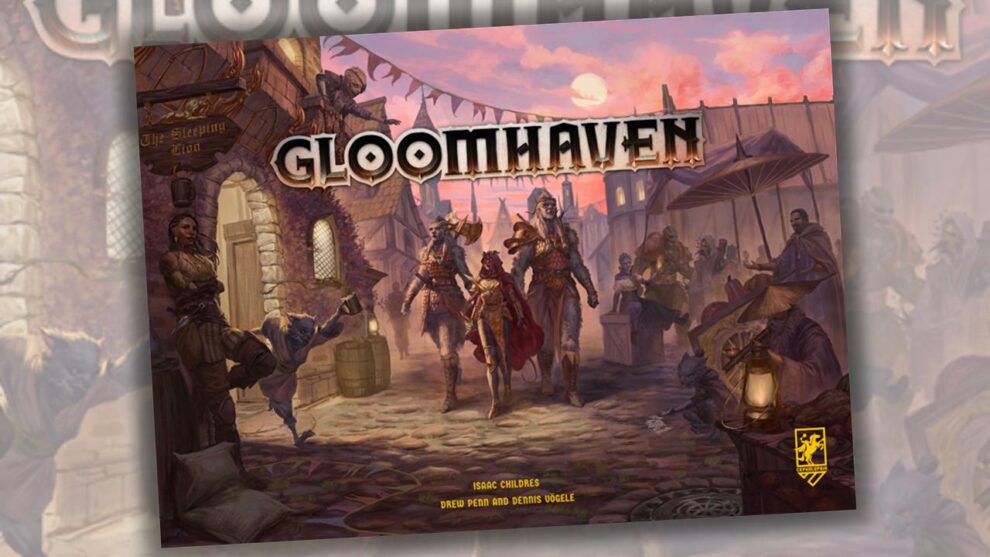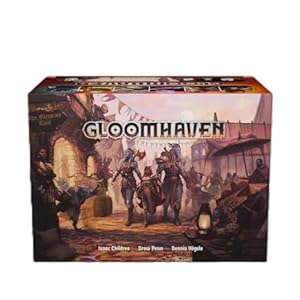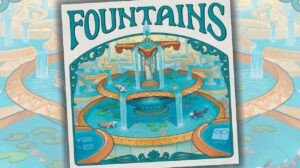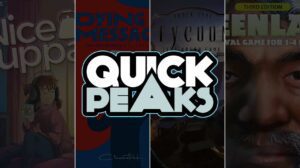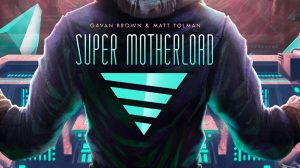Disclosure: Meeple Mountain received a free copy of this product in exchange for an honest, unbiased review. This review is not intended to be an endorsement.
Gloomhaven is both immensely popular and critically adored. Having now spent a significant amount of time with it, I have a better understanding of why. It’s fun. It comes in a ginormous box. There’s lots of stuff in the box.
However, understanding why something is popular is different from being able to recommend to others or seek it out myself (I received a review copy). I think I can recommend Gloomhaven to a certain type of game group or player, but I cannot breathlessly recommend it wholeheartedly to anyone-everywhere-all-the-time. This game retails at ~$200, so I think it’s important to help people understand what makes it interesting, and what aspects are less so.
People online are often very dogmatic about things that they like, and critique often falls by the wayside. It’s important to understand what a work of art is intentionally and unintentionally doing when you interact with it, to interpret how it actually makes you feel versus what it might be attempting to evoke.
It’s complicated, is what I’m saying.
As a note, this is a review of the second edition. I have no context for the differences between the new edition and the original version of Gloomhaven, but from what I understand reading others, there’s a general improvement in quality across the board. I won’t be talking about edition differences here. I’m late to the party, I’ve never gloomed before.
What is Gloomhaven?
Gloomhaven is a cooperative fantasy dungeon crawler. The flow of the game is straightforward. You start with an opening scenario where you go beat some guys up for money, and then you return to the city to spend your loot before choosing another scenario where you go beat some more people up. In the city, you have a random event where you make a “choose (a) or (b)” type of choice that’s read off a card, and you have a similar event when you’re on the “road” to the scenario you’re about to undertake. As the game continues, you’ll find yourself having different choices for which scenarios to explore, and sometimes you’ll get random ones (I found myself going to stop a lava ritual at one point).
I hope this doesn’t sound too dismissive, as that is not the intent. Essentially, that is what you’re doing. However, there is quite a bit to the whole “beating guys up” part, and that’s where the bulk of the game gets interesting. More on that later.
But that’s the flow: read some text, go do a scenario, read a bit more text, level up, rinse and repeat for a metric ton of scenarios. But what is the flavor of it all?
Gloomhaven as CRPG
Aesthetically, Gloomhaven seems like it was created by people who’ve played a lot of CRPGs (computer role-playing games). I’ve loved games like that since I’ve been conscious, and my crusty self can recall playing pirated copies of the original Baldur’s Gate and Icewind Dale on the public library computers as a latchkey kid. The aesthetic of Gloomhaven is very much drawn from fantasy art of the Black Isle and BioWare products of yore. In particular reminds me of Dragon Age II, a game that takes place entirely within the city of Kirkwall. The scope is broader here, but there’s a lived-in quality to the aesthetic that’s nice.
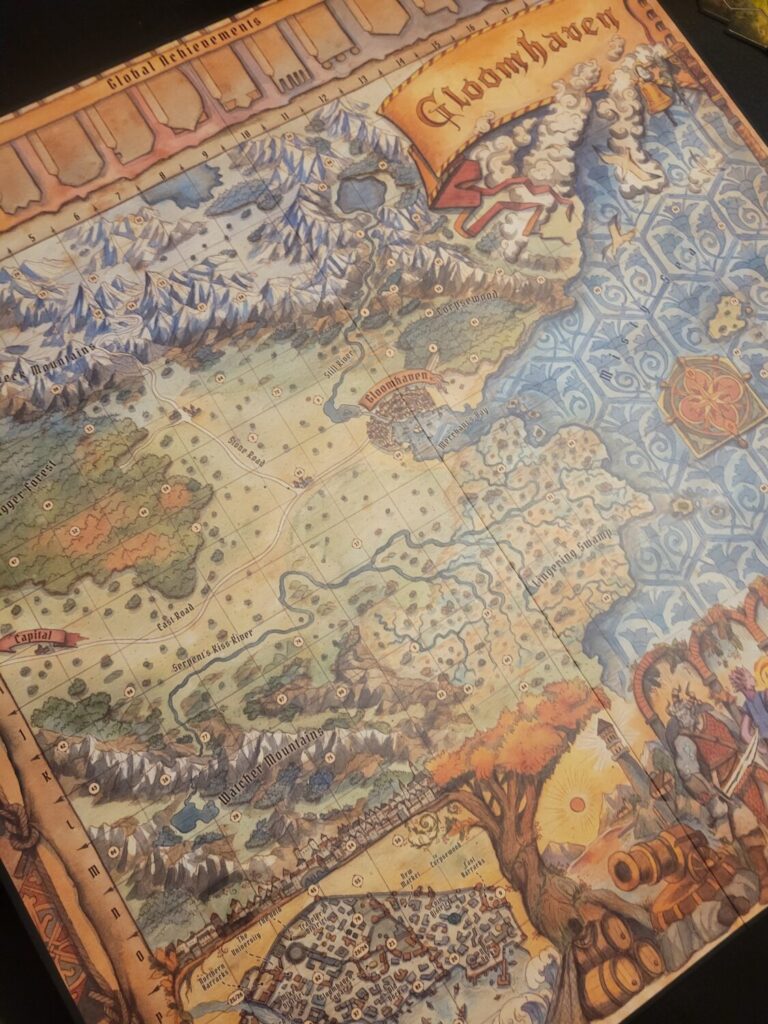
Isometric CRPGs often follow a similar arc as Gloomhaven. You have a whole bunch of text you read and respond to, and then you beat up some guys. You manage a suite of special abilities and try to use them to stay alive and not get destroyed by an AI.
If you are hoping for an experience like a CRPG, especially as a solo player, I cannot recommend Gloomhaven, for a pretty simple reason: it doesn’t add much to the canon, and it requires significant time investment to enjoy. It’s not something you can just drop into. I’m not an essentialist, so I believe video games and board games can be talked about concurrently. Gloomhaven requires a significant time investment to set up and learn the rules, and you’re getting about 1/6th the complexity of a CRPG from 20 years ago, let along some of the titles that are available currently. If Gloomhaven appeals to you, and you have a low-end computer, I highly recommend checking out the Pillars of Eternity series for a comparable experience with far better writing and depth of decision-making. It might seem unfair to make this comparison, but I’m balancing being a critic and a consumer recommender here (my least favorite thing to do), but honestly, it might cost you less money to play 4 CRPGs by yourself than to play Gloomhaven solo.
But how does it fare with a group?
Gloomhaven as tabletop RPG experience
I have often heard dungeon crawlers like Gloomhaven and Gloomhaven itself be compared to tabletop RPGs like Dungeons & Dragons and Pathfinder. This is a baffling comparison. It’s like saying being in a live theater production is the same as putting together a 1000-piece puzzle. The tabletop RPG experience would be best described as lightly-rules structured improvisational theater with your friends. Gloomhaven is nothing like that, beyond the setting being fantasy. I’ll talk more about this in the next section, but the game is one of the more exacting efficiency puzzles I’ve come across, and the exacting nature of it leaves no room for improvisation, daring, cowardly behavior, brave behavior, theatrical flourish, or just making stuff up.
The primary characteristic of a TRPG is the flexibility of play. You have a person whose job it is to facilitate with the help of the players a mind palace that everyone gets to fantasize within. It requires enormous creativity from everyone involved to make the whole thing work. Gloomhaven is a scenario based dungeon crawler where the goal is to efficiently defeat the parameters of the scenario. You can lose in Gloomhaven. You cannot lose in D&D.
If you’re looking to have a tabletop RPG experience, you should seek out a tabletop RPG experience. In the time it took me to punch the game out, learn the rules, set up the first scenario, and come to grips with the mechanics, I could have created the first several sessions of a fantasy RPG campaign for my friends, and that would offer much of what Gloomhaven is attempting to offer, with five times the creativity.
So, it’s not a tabletop RPG for you and your friends. Now, we can talk about what it is.
Gloomhaven as puzzle book
The second edition of the game comes with a separate puzzle book, which is a big clue as to what type of game you have here. Now I can gush about how cool the puzzle is.

In the game, you’ll play a character that brings a limited amount of cards to a scenario. Each round of the game, you’ll play two cards in a face down stack. The one on top, when flipped over, determines your initiative for the round, compared to randomly cycling monster decks and the other players. You’re limited in how much you can communicate to the other players. Then, you do one ability from the top half of one card, and the bottom half of the other. There are “elements” that are collectively managed and used by the players to do powerful skills, and sometimes the enemies mess with that. Whenever an attack is made, there’s a deck of cards that essentially functions as a random number generator to modify the power of the attack, sometimes resulting in a miss. Played cards go in a discard pile, and only return to the hand when you “rest,” which, depending on the type, has you “lose” one card, which typically means you won’t have access to it for the rest of the scenario. This is ingenious, as it simulates you character getting tired, and adds momentum to the scenarios. You have to keep moving and taking risks, because many scenarios require you to kill everything there, and you won’t have the luxury of taking your time before your cards have become lost.
That’s the main thrust of Gloomhaven: never stop moving forward. The propulsiveness of the game is one of its mechanical strengths.
There’s enormous amounts of creativity on display with the character design. For instance, I was playing a Spellweaver, who has powerful attacks that are lost after use. They have a card that lets them return these attacks to their hand, but only once. So, you spend a lot of time positioning yourself to hit for maximum effect or set up one-twos with other characters.
This is where the game shines. There’s a delightful puzzle to be found in each scenario. I know I described it as “beat up some guys” but there’s fast guys, slow guys, guys with armor, guys who jump around, guys who freeze you, guys who poison you, etc, etc.
And the game doesn’t pull punches. I had to play the first scenario 4 times before I got my characters figured out, but those failures taught me how to play better and I got into the flow of taking down different scenarios and challenges as the game progressed (I’m being a little vague to avoid spoilers).
It’s exacting, and when you figure out how to make a character work, it feels really good. The progression system of the game also has you forcibly retiring your characters as you play, so you can’t just take one character all the way to the end of the game–it’s highly likely that you’ll have to pivot to different play styles as the game goes on.
It’s a puzzle. It’s a good puzzle, but the exacting nature of the puzzle moves it out of the final category, which was the larger disappointment for me.
Gloomhaven as a dungeon crawler
When I wrote about Too Many Bones I mentioned my love of “overlord” games, where one player plays the enemies, and the other players play the characters. Gloomhaven is cooperative, where the players are battling a mechanical opponent, rather than a human one. I’m not a big fan of cooperative games, mainly because, very simply, no game designer or system is smarter than 2-3 motivated individuals. People are intelligent—mechanisms less so.
All the artifice and cleverness in the world starts to fall apart when one player realizes that you can collectively game the dumb AI of the monsters to kill them easier by getting them stuck in a doorway.

This is a feature of games like this, and one I don’t find particularly pleasant. Gloomhaven bills itself as a game where there’s shifting motivations in the background. There’s a treasure system where players get to keep the treasure they find and cannot trade it with others, which you would assume would have people ruining the fights in the game to go and grab a shiny item, but this doesn’t really play out in reality. Often, the threat of having to replay a scenario because of greed is less interesting than everyone getting to progress, and this provides social pressure. Most of the time, the extra bits are grabbed if there’s spare action economy, which there often isn’t.
What this means is that the game falls into all the common tropes of cooperative games. Groupthink and quarterbacking are the order of the day, especially when everyone starts to become familiar with the characters.
I cannot help but imagine how cool Gloomhaven might be as an “overlord” game or a game with more player friction, especially considering that Guards of Atlantis II exists, featuring a very similar combat and skill system, but tuned to team vs. team puzzle combat.
Imagination and storytelling
I think one of the pernicious things that the board game industry preys upon is the false belief that people who want to play games are doing so because they want someone to imagine and create for them. Admittedly, I’m a bit of a snob, and I found the world of Gloomhaven to be at best, tropey.
You’re not going to find the worlds of Butler, Wolfe, or Erikson here. It’s mostly your standard fantasy stuff: glowing orbs and variations of elves, orcs, and giants. If you’re looking for that kind of experience with friends, I’ve outlined some things above, and if you worry that tabletop RPGs are too much of a time investment, I will point out two things. One, there are plenty of one-shot RPG experiences (I recommend Fiasco and Durance) that only take an evening. Plus, you’re doing improv! If you don’t remember a rule, make one up!
Second, time and group investment. If you’re a hobbyist gamer, it’s likely that you’re in groups that are playing many different games. Gloomhaven will not fit well within that rotation. I have organized my apartment around playing board games, and this behemoth stretched my capacities, between the huge box, 1,000,000 components, 3 books, and all the tracking material. The campaign of the game could see you playing 30-60 scenarios to complete. It’s a game where a single scenario can take 15 minutes to prepare and 1.5+ hours to play. That’s significant, and I am hard-pressed to find a group willing to do that, which is why I played the game mostly solo. Given that, does making your own GURPS campaign sound that bad?
Now, with all those caveats, can I recommend it? Yes, if you’re looking for a superlative euro puzzle experience. The other parameters? That’s up to you.


